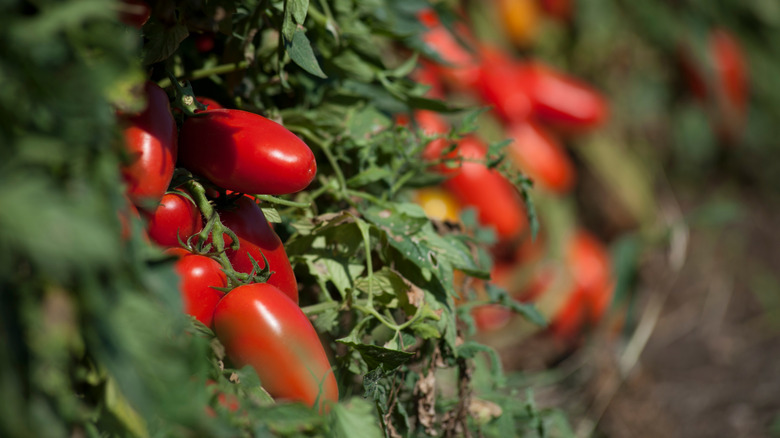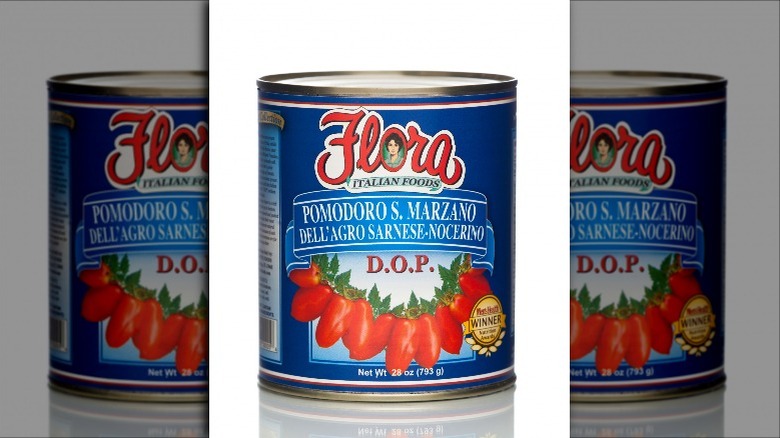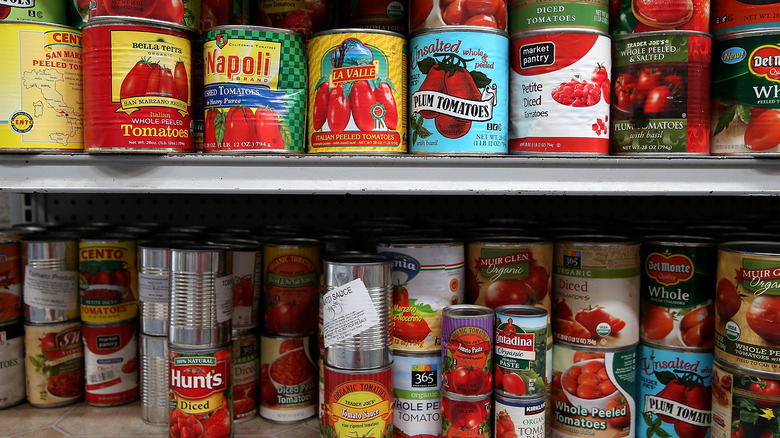Why Alton Brown Is Warning People About San Marzano Tomatoes
Whether you're eating them in a salad or using them as the base of an ultra scrumptious pasta sauce, tomatoes always add something special to a dish. According to Home Stratosphere, there are more than 10,000 different and deliciously distinct varieties of tomatoes that exist in the world, coming in a myriad of colors ranging from pink to yellow to white. One variety of tomato that is a fan favorite among many food enthusiasts and even more celebrity chefs like Anne Burrell and Ina Garten are San Marzano tomatoes.
San Marzano tomatoes are famous for their sweet taste and thicker flesh and are seen as some of the best types available on the market. San Marzano tomatoes can be traced back to 18th century Italy and, like most authentic Italian products, are cultivated in the San Marzano sul Sarno region near Naples (via Gardening Channel). Unfortunately, San Marzano tomatoes have suffered a food assault of sorts, as Food & Wine and famed Iron Chef personality Alton Brown have long questioned their authenticity. On Food & Wine's Twitter, a fan of Brown's pointed out how the chef has been noting for years that most canned San Marzano tomatoes are fake — eliciting praise from Brown himself in a Tweet.
About 95% of canned San Marzano tomatoes aren't authentic
Food & Wine reports that the tomato market has been sadly flooded with a plethora of counterfeit San Marzano tomatoes, noting a report from the Consorzio San Marzano (aka the Consortium for the Protection of the San Marzano Tomato Dell'agro Sarnese Nocerino) that says, out of all the cans labeled "San Marzano tomato," only 5% are an actual product of Italy. Danielle Aquino Roitmayr of the Italian import company Gustiamo reveals to Taste that some Italian companies will ship tomatoes to the United States sans the official label from the Consorzio San Marzano and US companies will simply slap on the sticker and call it a day. And since there is no official body that oversees this process, those companies can get away with it.
Taste further reveals that some companies won't even hide that the tomatoes aren't San Marzano and will add that note in the fine print on the nutritional label on the back of the can. But, what happens when you can't distinguish whether your tomatoes are legitimate or not? Taste says that official San Marzano tomatoes only come whole or in fillets, peeled, and canned — so if you see diced or crushed San Marzanos, they're fake. Another sign that they aren't real? If the price seems like a total steal. Food & Wine cites how authentic San Marzano tomatoes will probably cost you a "pretty penny."
The foolproof way to ensure you're getting the real thing
Apart from reading the label's fine print carefully, evaluating the price, and looking for the style of the tomatoes, there are two more tell-tale items you can look for to ensure you're buying real San Marzano tomatoes. According to Food & Wine, cans of real San Marzano tomatoes will have two very specific labels on them that cannot be forged or manipulated: a D.O.P. seal and a Consorzio San Marzano certification number. These may both appear as a banner around the top of the can or might be stamped somewhere toward the bottom of the can.
D.O.P. stands for Denominazione d'Origine Protetta which means "Protected Designation of Origin" (via Eataly). This seal and designation is organized and controlled by the European Union and serves as proof that the product that bears its designation is authentic (via La Cucina Italiana). To be stamped with the D.O.P. seal, the product must come from the correct origins and have the proper production and manufacturing standards to be awarded the label.
Many wines, cheeses, and other products from specific European countries and regions use this system as well to protect what is marketed as their products. Just like only wine from the Champagne region of France can be called "champagne," only San Marzano tomatoes with a D.O.P. seal can be totally trusted as the real thing.
Where to shop for real San Marzano tomatoes
Now that you know what to look for — seeking out San Marzano tomatoes that feature a D.O.P. seal and a Consorzio San Marzano number — you should know about the best places to shop to find the real tomatoes. While you can purchase cans online with retailers like Gustiamo or even Eataly, both of which are known to sell quality Italian foods, you might feel better buying in person. Whether you need San Marzanos right away for a recipe or you've been duped in the past and like to see what you're buying face-to-face, there are brick-and-mortar stores you can visit to find what you need.
Though it may seem surprising, Trader Joe's has been stocking more D.O.P.-certified products over the past few years and is worth checking out. You might even find D.O.P.-backed San Marzano tomatoes at your go-to supermarket. But if you can't, then you should try shopping at an Italian specialty store or even an international market to get the most authentic options.



